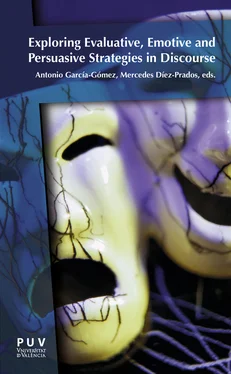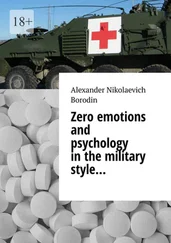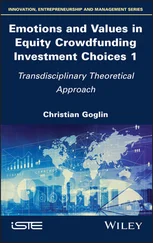Carretero, Marta (2010). “‘You’re absolutely right!’: A corpus-based analysis of absolutely in British English and absolutamente in Peninsular Spanish, with special emphasis on the relationship between degree and certainty”. Languages in Contrast 10 (2), 194-222.
Carretero, Marta (2014). “The role of authorial voice in professional and non-professional reviews of films: An English-Spanish contrastive study of Engagement”. In Gil-Salom, Luz and Carmen Soler-Monreal (eds.) Dialogicity in Specialised Genres. Amsterdam / Philadelphia: John Benjamins, pp. 55-85.
Carretero, Marta and Maite Taboada (2015). “The annotation of Appraisal: How Attitude and epistemic modality overlap in English and Spanish consumer reviews”. In Zamorano-Mansilla, Juan R., Carmen Maíz, Elena Domínguez and M. Victoria Martín de la Rosa (eds.) Thinking Modally: English and Contrastive Studies on Modality. Bern: Peter Lang, pp. 249-269.
Carretero, Marta and Juan Rafael Zamorano-Mansilla (2013). “Annotating English adverbials for the categories of epistemic modality and evidentiality”. In Marín-Arrese, Juana I., Marta Carretero, Jorge Arús Hita and Johan van der Auwera (eds.) English Modality: Core, Periphery and Evidentiality. Berlin / Boston: De Gruyter Mouton, pp. 317-355.
Hansen-Schirra, Silvia, Stella Neumann and Erich Steiner (2012). Cross-linguistic Corpora for the Study of Translations – Insights from the Language Pair English-German. Berlin: de Gruyter.
Langacker, Ronald W. (2009). Investigations in Cognitive Grammar. Berlin: Mouton de Gruyter.
Lavid, Julia, Jorge Arús, Bernard DeClerck, and Veronique Hoste (2015). “Creation of a high-quality, register-diversified parallel (English-Spanish) corpus for linguistic and computational investigations”. Procedia – Social and Behavioral Sciences 198, 249-256.
Lavid, Julia, Marta Carretero and Juan Rafael Zamorano Mansilla. (2016). “A linguistically-motivated annotation model of modality in English and Spanish: Insights from MULTINOT”. Linguistic Issues in Language Technology 14, 1-35.
Lavid, Julia, Marta Carretero and Juan Rafael Zamorano Mansilla (2017). “Epistemicity in English and Spanish: An annotation proposal”. In Marín-Arrese, Juan I., Julia Lavid-López, Marta Carretero, Elena Domínguez Romero, Mª Victoria Martín de la Rosa and María Pérez Blanco (eds.) Evidentiality and Modality in European Languages. Discourse-Pragmatic Perspectives . Bern: Peter Lang, pp. 241-276.
Lichtenberk, Frantisek (1995). “Apprehensional epistemics”. In Bybee, Joan and Suzanne Fleischman (eds.) Modality in Grammar and Discourse . Amsterdam: John Benjamins, pp. 293-327.
Marín-Arrese, Juana I. (2011). “Effective vs. epistemic stance and subjectivity in political discourse: Legitimising strategies and mystification of responsibility”. In Hart, Christopher (ed.) Critical Discourse Studies in Context and Cognition , ed. by Christopher Hart. Amsterdam / Philadelphia: John Benjamins, pp. 193-223.
Martin, James R., and Peter R. R. White. (2005). The Language of Evaluation . New York: Palgrave.
Mora, Natalia (2011). Annotating Expressions of Engagement in Online Book Reviews: A Contrastive (English-Spanish) Corpus Study for Computational Processing . MA Dissertation, Universidad Complutense de Madrid, available at http://eprints.ucm.es/13754/(Accessed 27 December, 2017).
Nuyts, Jan (2001). Epistemic Modality, Language and Conceptualization. A Cognitive-pragmatic Perspective. Amsterdam / Philadelphia: John Benjamins.
Palmer, Frank R. (1990). Modality and the English Modals. London and New York: Longman.
Paulussen, Hans, Lieve Macken, Willy Vandeweghe, and Piet Desmet (2013). “Dutch parallel corpus: A balanced parallel corpus for Dutch-English and Dutch-French”. In Spyns, Peter and Jan Odijk (eds.) Essential Speech and Language Technology for Dutch . Springer: Cham, pp. 185-199.
Voloshinov, Valentin N. (1973). Marxism and the Philosophy of Language . (Translated by Ladislav Matejka and I.R. Titunik.). London: Seminar Press.
White, Peter R. R. (2002). “Appraisal”. In Östman, Jan-Ola and Jef Verschueren (eds.) Handbook of Pragmatics . Amsterdam / Philadelphia: John Benjamins, pp. 1-27.
White, Peter R. R. (2015). An Introductory Course in Appraisal Analysis . Retrieved at < http://www.grammatics.com/appraisal>, webpage updated December 27, 2015.
Appendix
References and URLs of the texts analysed:
EO_ESS_001: Joseph E. Stiglitz, “A Greek morality tale”, Project Syndicate, February 3, 2015.
https://www.project-syndicate.org/commentary/greece-eurozone-austerity-reform-by-joseph-e--stiglitz-2015-02?barrier=true
EO_ESS_004: Laura Tyson and Saadia Zahidi, “The slow march to gender parity”, Project Syndicate, October 31, 2014.
https://www.project-syndicate.org/commentary/closing-gendergap-economic-participation-by-laura-tyson-and-saadia-zahidi-2014-10?barrier=true
EO_ESS_005: Michael J. Boskin, “A five-step plan for European prosperity”, Project Syndicate, February 25, 2015.
https://www.project-syndicate.org/commentary/europe-prosperity-obstacles-by-michael-boskin-2015-02?barrier=true
EO_ESS_006: J. Bradford DeLong, “Making Do with More”, Project Syndicate, February 26, 2015.
https://www.project-syndicate.org/commentary/abundance-without-living-standards-growth-by-j--bradford-delong-2015-02?barrier=true
EO_ESS_009: Nouriel Roubini, “Where Will all the Workers Go”, Project Syndicate, December 31, 2014.
https://www.project-syndicate.org/commentary/technology-labor-automation-robotics-by-nouriel-roubi-ni-2014-12?barrier=true
EO_EXP_001: Bill Bryson, “How to build a universe”. A Short History of Nearly Everything . (Fragment). New York: Doubleday, 2003
http://www.nytimes.com/2003/05/18/books/chapters/0518-1st-bryson.html?pagewanted=all
EO_EXP_002: Carl Sagan, Cosmos. (Fragment). New York: Random House, 1980.
EO_EXP_003: Richard Dawkins, The Selfish Gene , third edition. (Fragment). Oxford: Oxford University Press, 2006.
http://www.geoffwilkins.net/fragments/Dawkins.htm
EO_EXP_015: Roger Penrose, The Emperor’s New Mind: Concerning Computers, Minds and the Laws of Physics. (Fragment). Oxford: Oxford University Press, 1989.
EO_EXP_020: Steven Pinker, The Blank Slate. The Modern Denial of Human Nature . (Fragment). London: Penguin, 2002.
ETrans_ESS_001: Daniel Innerarity, “Nostalgia for quiet passions”, 2011, translated by Peter J. Hearn.
http://www.essayandscience.com/article/30/nostalgia-for-quietpassions/,
ETrans_ESS_002: Víctor Gómez Pin, “Redention and the Word”, 2009, translated by Mike Escárzaga.
http://www.essayandscience.com/article/2/redemption-and-the-word/
ETrans_ESS_003: José Álvarez Junco,”Machiavelli and the chosen people”, 2011, translated by Peter J. Hearn.
http://www.essayandscience.com/article/22/machiavelli-and-the-chosen-people/
ETrans_ESS_004: Javier Gomá Lanzón, “Unacknowledged geniuses do not exist”, 2010, translated by Jennifer Brooke Hoge.
http://www.essayandscience.com/article/4/unacknowledged-geniuses-do-not-exist/
ETrans_ESS_005: Rafael Argullol, “Catharsis and cure”, 2010, translated by Mike Escárzaga.
http://www.essayandscience.com/article/13/catharsis-and-cure/
ETrans_EXP_003, ETrans_EXP_004, ETrans_EXP_005, and ETrans_ EXP_016: Eduardo Galeano, Open Veins of Latin America. Five Centuries of the Pillage of a Continent. (Fragments).Translated by Cedric Belfrage. New York: Monthly Review Press, 1997.
Читать дальше












